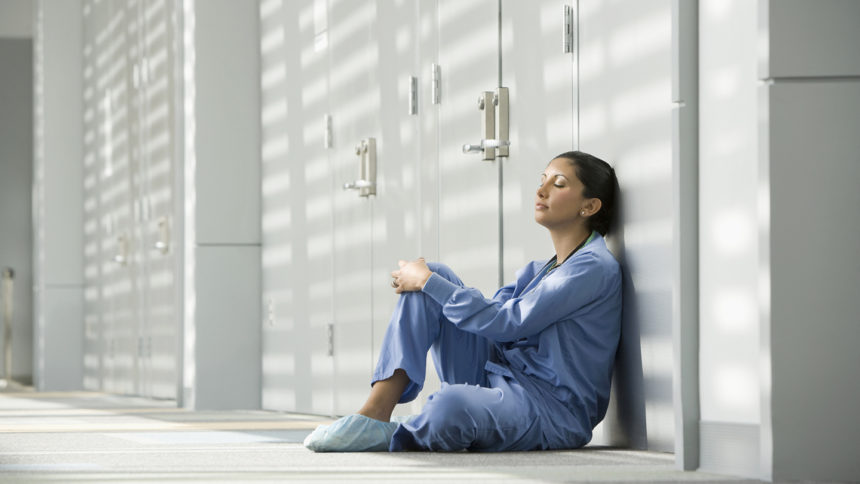
While the COVID-19 pandemic had an detrimental impact on almost every part of the world, its full effects on the “care force” are just beginning to be understood.
In the special McKnight’s webinar “The new reality of mental health and workplace well-being in a post-Covid world,” sponsor KARE presented more findings from its 2024 Trauma and Resilience study, which looked at the state of mental health and personal well-being in the workplace. The session offered valuable insights into the intersection of workplace well-being with safety, sense of community, inclusivity and level of respect.
Katie Rhone, Senior VP of HERO and Employee Experience at KARE, recapped results of the first part of KARE’s study, which was conducted in association with the National Association of Health Care Assistants. That study sought to assess how pervasive identifiers from CDC-Kaiser Permanente’s adverse childhood experiences (ACE) study were within the care workforce. Childhood abuse and neglect and household challenges have been shown to affect later-life health and well-being and can lead to high risk of toxic stress levels, Rhone noted.
High toxic stress levels cause people to revert to fight, flight, freeze or fawn mode and impede their ability to think critically — a major disadvantage for care force workers whose positions require sound judgment.
KARE’s study found that while 64% of the general population reported at least one type of adverse childhood experience, in the care workforce that percentage rose to 73%, and 34% reported four or more types of ACEs.
“It’s important to keep in mind that our particular population of employees have been significantly impacted by childhood adversity,” added speaker Jean M. Hartnett, MHSA, NHA, CDP, YTT, CNA, founder, Radical Sabbatical.
The report also revealed that 65% of the care force has never sought mental health support nor therapy, so they aren’t necessarily getting the help that they need.
More attention needed to workforce mental health
“For so long we have thought about employee health one-dimensionally,” noted Hartnett. “I don’t think we have taken enough time to look at mental fitness for work and understand how important it is for individuals coming to our communities.”
KARE’s second report aimed to take an even deeper dive into care force mental health by examining how the COVD-19 pandemic affected workers.
“We haven’t done a great job understanding why we continually lose people and have decreasing quality metrics in resident care areas,” said Hartnett. She noted that considering past trauma and toxic stress levels can help address those issues. “We have to ask the difficult questions and be prepared for answers we may not want to hear,” she noted.
To that end, the second part of KARE’s survey asked six questions across four categories: safety, sense of community, inclusivity and respect, to determine how employees felt about their workplace.
The study found 58% of respondents felt encouraged to share creative ideas without fear of judgment and 61% felt safe sharing feedback with others. Also, 58% said they felt part of an innovative and strong community and 77% reported feeling safe to be their true authentic selves at work. When asked if they felt respected by their peers in the workplace, 77% said they did and 69% felt respected by the management team. Those numbers seem to tell a positive story about the care workplace environment.
RNs most likely to feel disaffected
Yet Rhone cautioned that there are nuances among the numbers.
“Overall, CNAs and CMAs were very positive. Registered nurses had a different feeling about these categories and questions,” she added. “When it comes to safety, only 44% of RNs reported feeling psychologically and interpersonally safe, which is 12% lower than the general population.”
And only 29% of RNs said they feel a sense of community at work, 13 percentage points lower than the total population. Meanwhile, 34% of RNs did not feel able to be their true, authentic self at work and 8% of RNs felt unrecognized in the workplace.
Those results suggest the need for management to “rethink the role of the nurse and how much we expect of them,” said Hartnett. “When RNs are feeling this unsafe, feel a lack of community and don’t feel included and respected, we have a lot of work to do in all of these areas.”
Hartnett noted the importance of fostering an environment in which employees can show up as their true authentic selves rather than expecting employees to “fit in.” She recommended that organizations enhance psychological safety by establishing regular RN-led forums and support groups where nurses can feel “safe and comfortable conversations with one another to improve inclusivity and respect.”
Inclusivity training and workshops that celebrate the diverse backgrounds and contributions of nursing teams help to promote a more accepting, supportive and cohesive work environment, she added.
Since nurses often feel singled out and responsible when bad health outcomes happen, good work environments focus on “system failures, not individual failures.”
“Taking a trauma-informed lens to issues to bring empathy to understanding behaviors is important,” Rhone said. A “What happened to you?” rather than a “What’s wrong with you?” approach is far more productive.
Implementing robust recognition and reward systems based on how people want to be recognized is also an important part of a healthy workplace.
“Not everybody wants to be recognized the same way so we can’t take a one-size-fits-all approach to how we recognize and reward nurses,” Hartnett cautioned.




